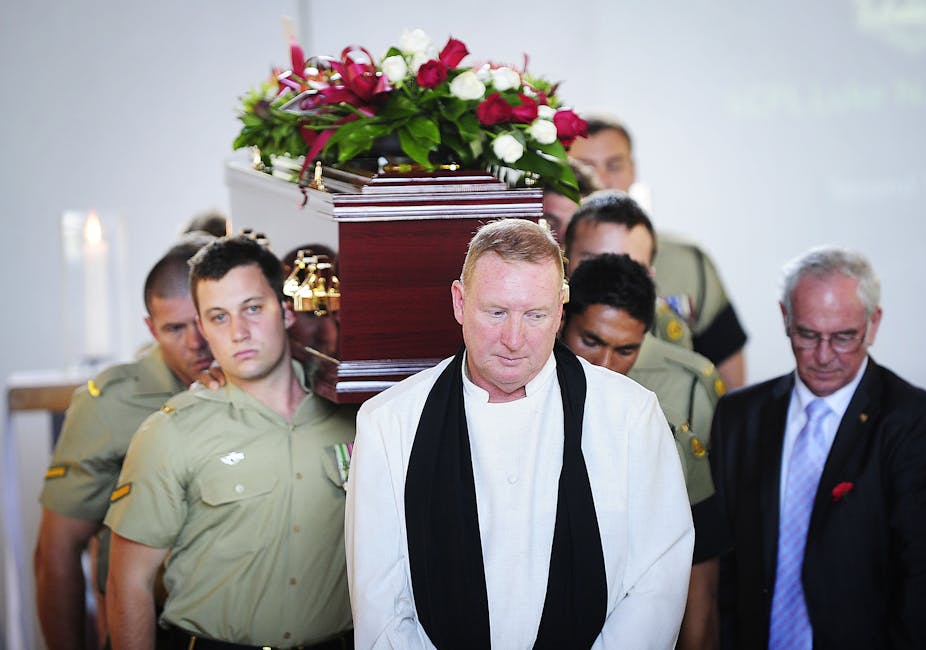Another Australian soldier has tragically lost his life while on his seventh tour in Afghanistan. The 40 year-old special forces soldier from Perth was shot while on a counter-insurgency operation in the Chora Valley.
Prime Minister Julia Gillard said the death was “a dreadful blow for the nation”, while Defence Force Chief David Hurley said he hoped the family could find comfort “in the knowledge that this soldier served his country with pride…” The funeral arrangements are yet to be announced.
The death of a soldier speaks to us in a way that few other things do, and demands reverence, mourning, and profound respect. The most recent funeral for an Australian soldier Corporal Ashley Birt, held last year, had thousands of people attending, many of whom didn’t know the deceased personally.
The controversial Westboro Baptist Church has made headlines by picketing military funerals in the US. Debate has raged about the Church’s right to picket, but Americans have been unified on one thing: their behaviour is repulsive.
There is something about the funeral of a soldier who has died at war that we see differently, and find particularly awful when it is disrespected.
In our society, there are two common explanations for the elevated status of the dead body: respect and religion.
The word that’s most often invoked around funerals is respect; we go to funerals to “pay our respects”. And it makes a lot of sense to speak about burial rites in this way. We pay homage to the dead body because in so doing, we pay homage to the person that was – and for many religious believers – still is.
This leads us to the second explanation: religion. It’s next to impossible to separate burial practices from religious beliefs – from mummification to cremation, burial prayers and funeral dress – all of these reflect deeper beliefs about the soul and the afterlife.
So, for the religious believers, the reason the dead body gets so well treated is because there is still a person to treat: not an embodied person, but some kind of spirit.
Sacred burial practices are then about respect for the previous person, and respect for the existing person (who exists in some new way). Personhood and love for the individual who has died lie at the heart of all these practices.
But in military funerals, it seems less likely the attendees are there because of the individual who has died; it’s unlikely that many of them know the soldiers at all.
Obviously a lot of funeral traditions maintain their significance from the personal religion of the person who died and his family, but in a self-proclaimed “secular” society, the same cannot be said for state funerals like the military ones in question. And certainly it seems a stretch to argue that all of the people who attend such funerals share those religious beliefs.
So why do people who haven’t had a personal relationship with the deceased still find some sense of meaning from the public military funeral rite?

Some of our burial practices are just cultural hangover and assimilated practice; what we have done for years we continue to do. But there is something more to it than that, something that boils the blood when we hear about Westboro, and that drives thousands of people to a funeral of men and women they didn’t know.
In part it’s gratitude for their sacrifice, but it seems that the transcendent belief that has replaced – or become – religion here is Patriotism.
In fact, it’s from patriotism that we derive our gratitude; these servicemen served their nation – us – and we thank them for that. In mourning their loss, in going to their funeral, we too are patriots. That aspect of human experience that institutional religion used to fill is now filled by the nation.
The body of the deceased soldier deserves reverence: this much is clear. It’s more clear when the deceased’s death was made in pursuit of some great good, or truth. It’s right for us to be horrified by Westboro, and it’s right to flock to military funerals.
It’s nothing new either; in Homer’s Iliad, Achilles dragged the dead body of Hector around the walls of Troy to the horror of even the gods.
Hector’s father, Priam, begged for the return of the body. When Hector was finally returned, the whole of Troy turned out for the funeral.

